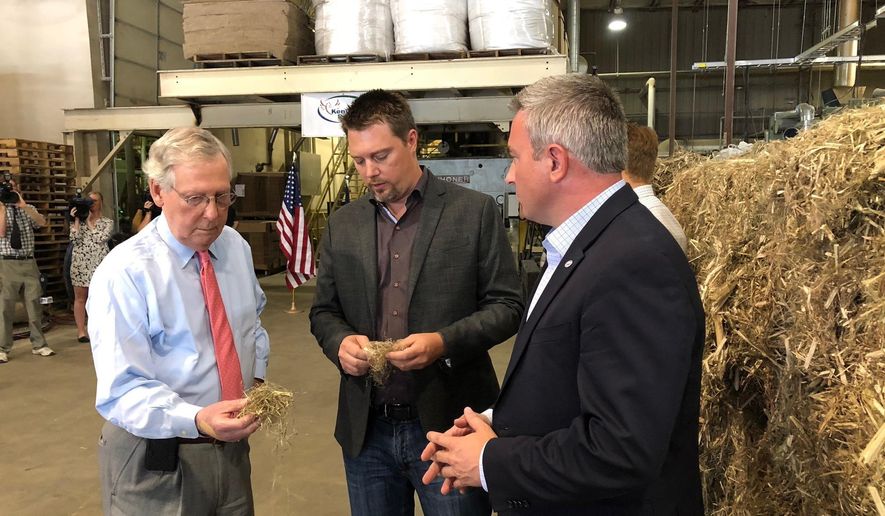Hemp advocates celebrated Tuesday after congressional negotiators reached a final deal on an $867 billion farm bill that would fully legalize industrial hemp, predicting it will push the U.S. to new heights in an emerging market.
Legalized industrial hemp has been a longstanding goal for its advocates, including Senate Majority Leader Mitch McConnell, who helped secure the provisions in the farm bill, saying even under the old, limited rules, his home state of Kentucky saw a $16 million boost to its economy from hemp last year.
“At a time when farm income is down and our growers are struggling, industrial hemp is a bright spot of agriculture’s future,” Mr. McConnell said Tuesday.
He led the Senate in approving the farm bill 87-13 Tuesday. It still needs House approval before heading to President Trump.
The legislation would continue generous subsidies to America’s farmers and renew the food stamp program for five years.
The bill leaves out new work requirements for food stamp recipients that Mr. Trump and House conservatives had demanded, though it does include new accountability measures for the program and bolsters funding for work training.
Republican leaders declared victory.
“This bill strengthens work requirements for our federal nutrition benefit programs, and uses savings to better train and equip our workforce — reforms we have long sought to help more Americans move from welfare to work,” said House Speaker Paul D. Ryan, Wisconsin Republican.
In a nod to conservatives who had pushed the new work requirements, Agriculture Secretary Sonny Perdue has said that his department will issue a rule allowing states to experiment with work requirements for some food stamp recipients.
The hemp changes in the bill have been developing for awhile. The 2014 farm bill paved the way for hemp research programs in the states.
Bruce Perlowin, the CEO of the company Hemp Inc., said the new language provides a “billion-dollar opportunity” for the American farmer and the American economy.
“Everything from the ability to open up bank accounts, to get crop insurance — giant hedge funds are now [allowed] to buy hemp stocks — it changes the entire economic complexion of the industrial hemp industry,” he said.
A federal ban had effectively halted production of hemp for years over fears that it would pave the way for the cultivation of marijuana.
The 2014 farm bill had defined “industrial hemp” as having a maximum concentration of THC — the intoxicant chemical in cannabis plants — of 0.3 percent. The new farm bill would remove industrial hemp from the same federal regulatory category as marijuana.
Mr. Perlowin said the changes should make life easier for people in the industry, who have struggled for respectability.
Chase Terwilliger, CEO of CBDistillery, which specializes in cannabidiol products, said the new language will clear up gray areas from the Drug Enforcement Administration on what companies can legally grow and sell.
“The biggest struggle that we faced when building our business was that yes, the DEA never interfered with us or really any of our competitors, but banking institutions, outside capital, insurance companies — we even had trouble finding office space because nobody would deal with that kind of gray area,” he said.
Mr. Terwilliger said the new rules could open up more opportunities for rural farmers who have been unwilling to stomach the same risks or who have been suffering from recent poor crop production.
“This has been a major money-generator for rural farmers,” he said.
Sen. Ron Wyden, Oregon Democrat, said the “outrageous and outdated” ban on growing hemp has hamstrung farmers in his own state.
“Hemp products are made in America, sold in America, and consumed in America,” he said. “Now, hemp will be able to be legally grown in America, to the economic benefit of consumers and farmers in Oregon and nationwide.”
• David Sherfinski can be reached at dsherfinski@washingtontimes.com.




Please read our comment policy before commenting.